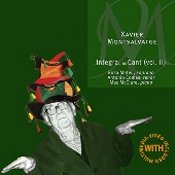Aware of this situation, shortly before his death and with a light dose of acrimony, he declared in an interview:
The weight of these compositions has followed me all my life, and I have not yet solved it. I don’t want to boast, but the songs are popular from Nepal to South Africa, which has the inconvenience that they overshadow the rest of my works.
[Carlos del Amo, “Xavier Montsalvatge,” EFE News Services (December 2, 1999).]
And indeed, they do. Recorded, completely, by Victoria de los Angeles, Montserrat Caballé, Marilyn Horne, Teresa Berganza and, partially, by Bartoli and Gheorghiu, these songs are among the most popular of the twentieth-century repertoire and—given its irresistible melodic charm—a favorite encore of all singers. Needless to say, all this results in a general lack of familiarity with his other, equally appealing, compositions. The fact is that Montsalvatge’s music has been premiered by internationally renown performers such as Nicanor Zabaleta, Alicia de Larrocha, Rostropovich, Rampal, Szeryng and many others. In addition, it has also been performed at the BBC Proms and at Lincoln Center (by the New York Philharmonic). Besides Columna, several international labels, including ASV and Marco Polo, have issued many recordings entirely dedicated to his music as well. Therefore, Montsalvatge’s so-called “problem” is not that he is unknown or that his works are poorly disseminated, but rather that his music is unevenly circulated and appreciated. To be sure, these two CDs will palliate this problem.
In recent times, Columna Música, the small, independent Barcelona label, has issued an incredible amount of Spanish music, including an on-going series dedicated to the issuance of the complete works of Montsalvatge. This latest installment includes the composer’s whole production for voice and piano. Volume I includes the composer’s songs cycles Canciones para niños, Canciones negras, and Quatre rimes breus de Josep Carner. Volume II focuses on single, self-standing songs as well as opera arias arranged for voice and piano. For the first time, therefore, listeners can appreciate the full spectrum of Montsalvatge’s vocal output and not only one of its segments. The songs, as a matter of fact, cover chronologically all his career as a composer since the first song dates from 1933 and the last was written in 2001.
Montsalvatge’s musical language overtly departs from the Germanic tradition prevalent in earlier Catalan composers (Pedrell and Gerhard among others). Instead, it shows a penchant for the irony, playfulness, and popular appeal of Les Six, as well as the rhythmic experimentation and formal clarity of Stravinsky. Although his language evolved and passed through different phases (including a serialist one), he is best known for his so-called “West Indian” style (early critics called it antillanismo), which was inspired by the sounds of the Spanish Caribbean. This period includes compositions such as Tres divertimenti (1941), Cuarteto indiano (1952), and of course the popular Cinco canciones negras (1945, orchestrated in 1949). On these two CDs the antillanismo is only audible in the celebrated Canciones negras. The rest of the songs, generally speaking, use relatively simple, appealing melodic lines accompanied by astringent, modern harmonies. A predilection for the world of children is also prevalent in most of his works (as is the case in Frederic Mompou’s oeuvre, another eminent Catalan composer), but especially in his Canciones para niños (with texts by García Lorca), also included here.
Some of the performers on these CDs seem to own, in the best sense of the word, Xavier Montsalvatge’s music. American-born, Barcelona educated pianist Mac MacClure was a friend of the composer and he worked closely with him in many projects, including the recording of his complete works. His accompaniment is subtle, expressive, and clean, as well as sensitive to the singers’ quirks. Soprano Rosa Mateu was the composer’s protégé and had the privilege of premiering many of his late vocal compositions. She brings to these recordings an intimate knowledge of the music and its world, as well as her remarkable vocal qualities. Marisa Martins is one of the rising stars in Barcelona’s vocal scene. Born in Argentina and educated in Barcelona, she has already sang opera at the venerable Gran Teatre del Liceu in her adoptive city. These recordings show her great talent for the song repertoire, too, and she brings to them an exact diction and a deep understanding of the text. All things considered, one only wishes that the popularity of the greatly admired versions of Cinco canciones negras by Victoria de los Ángeles et al. do not overshadow these performances the way the compositions themselves “followed” and became a “weight” for the composer. God forbid.
Antoni Pizà, Director
Foundation for Iberian Music, CUNY Graduate Center
